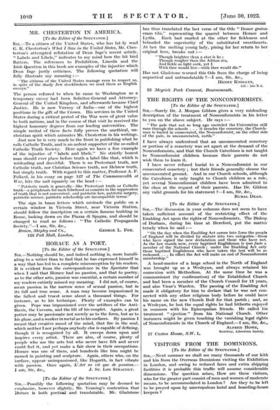HORACE AS A POET.
[To the Editor of the SPECTATOR.] SIR,—Notbing should be, and indeed nothing is, more humili- ating to a writer than to find that he has expressed himself in a way that has led to a complete misconception by his readers. It is evident from the correspondence in the Spectator that when I said that Horace had no passion, and that to poetry, as to the other arts, passion was essential, a certain number of my readers entirely missed my meaning. I did not, of course, mean passion in the narrow sense of sexual passion, but in its full and true sense. A man may become impassioned in the fullest and truest sense about a thousand things. For instance, as to his technique. Plenty of examples can be given. Pope was impassioned over the artifices of the Anti- thesis, the Caesura, and the lilt of his couplet. Again, a great potter may be passionate not merely as to the form, but as to his glaze, and a worker in metal as to his surfaces. By passion I meant that creative mood of the mind, that fire in the soul, which neither'I nor perhaps anybody else is capable of defining, though it is recognized by all. It sweeps down upon and inspires every artist. There are also, of course, plenty of people who use the arts but who never have felt and never could feel it, and yet make a fair show in their occupations. Horace was one of them, and hundreds like him might be named in painting and sculpture. Again, others who, on the *surface, appear unimpassioned, like Hogarth, in fact vibrate with passion. Once again, L'Art ne vit que de passion.—










































 Previous page
Previous page